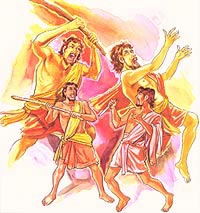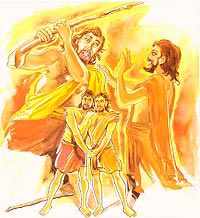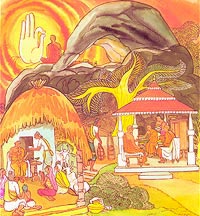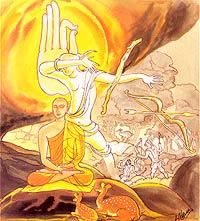31112 Saturday LESSON 740 -3) அவன் என்னை இகழ்ந்து
பேசினான். அடித்தான், என்னை தோற்கடித்தான். என் பொருள் கவர்ந்தான். என
மனதில் பகைமை வளர்த்தால் என்றுமே பகைமை தணியாது.
4) அவன் என்னை இகழ்ந்து
பேசினான். அடித்தான், என்னை தோற்கடித்தான். என் பொருள் கவர்ந்தான். என
மனதில் பகைமை வளர்க்காமல் இருக்கிறாரோ அவர் பகைமை தணியும்-Verse 404: Him I call a brahmana, who
associates not with the householder or with the homeless one, or with
both, who is free from sensual desire and has few wants.Verse 405: Him I call a brahmana, who has
laid aside the use of force towards all beings, the perturbed as well as
the unperturbed (i.e., arahats), and who does not kill or cause others
to kill.திரிபிடகம் மூன்று தொகுப்புகள் ![]() TIPITAKA- from FREE ONLINE eNālāndā Research and
TIPITAKA- from FREE ONLINE eNālāndā Research and
Practice UNIVERSITY through http://sarvajan.ambedkar.org
அக்கொச்சி மங் அவதிமங்
அஜினிமங் அஹாஸிமே
யேதங் உபனய்ஹந்தி -
வேரங் தேஸங்ன ஸம்மதி
Verse 3. Uncontrolled Hatred Leads to Harm
Who bears within them enmity:
”He has abused and beaten me,
defeated me and plundered me”,
hate is not allayed for them.
Verse 3: “He abused me, he ill-treated me, he got the better of me, he stole my belongings;”… the enmity of those harbouring such thoughts cannot be appeased.
அக்கொச்சி மங் அவதிமங்
அஜினிமங் அஹாஸிமே
யே தங்ன உபனய்ஹந்தி -
வேரங் தேஸஜீபஸம்மதி
Verse 4. Overcoming Anger
Who bears within no enmity:
”He has abused and beaten me,
defeated me and plundered me”,
hate is quite allayed for them.
Verse 4: “He abused me, he ill-treated me, he got the better of me, he stole my belongings;”… the enmity of those not harbouring such thoughts can be appeased.Dhammapada Verse 404
Pabbharavasitissatthera Vatthu
அஸங்ஸட்டங் கஹட்டெஹி -
அனாகாரெஹி சூபயங்
அனொகஸாரிங் மப்பிச்சங் -
தமஹங் ப்ரூமி பிராஹ்மணங்.
இல்லறத்தாரோடும், துறவிகளோடும் கலக்காமல், ஆசைகளை குறைத்துக் கொண்ட தேவைகளில் பற்றுத்லை ஏற்படுத்திக் கொள்ளாதவரையே நான் பிராமணர் என அழைப்பேன்.
 |
Verse 3. Uncontrolled Hatred Leads to Harm
Explanation: When a person holds that he was insulted, assaulted, |
 |
Verse 4. Overcoming Anger
Explanation: Living in human society, people often quarrel |
Verse 404: Him I call a brahmana, who associates not with the householder or with the homeless one, or with both, who is free from sensual desire and has few wants.
The Story of Thera Tissa
While residing at the Jetavana monastery, the Buddha uttered Verse (404) of this book with reference to Thera Tissa.
Thera Tissa, after taking a subject of meditation from the Buddha, went to a mountain side. There, he found a cave which suited him and he decided to spend the three months of the rainy season (vassa) in that cave. So he stayed in the cave and went to the village for alms-food every morning. In the village, there was a certain elderly woman who regularly offered him alms-food. In the cave, there also lived the guardian spirit of the cave. As the thera was one whose practice of morality was pure, the cave-spirit dared not live in the same cave with the noble thera; at the same time, he did not have the courage to ask the thera to leave the place. So he thought of a plan that would enable him to find fault with the thera and thus cause him to leave the cave.
The cave-spirit possessed the son of the elderly woman from the house where the thera usually went for his alms-food. He caused the boy to behave in a very peculiar way, turning his head backwards, and rolling his wide open eyes. His mother got alarmed and was in tears. The cave-spirit, who possessed the boy, then said “Let your teacher, the thera, wash his feet with water and pour that water on the head of your son.” The next day when the thera came to her house for alms-food, she did as she was advised by the cave-spirit and the boy was left in peace. The cave-spirit went back to the cave and waited at the entrance for the return of the thera. When the thera returned from his alms-round, the cave-spirit revealed himself and said, “I am the spirit guarding this cave. O you physician, do not enter this cave.” The thera knew that he had lived a clean life from the day he had become a thera, so he replied that he did not remember practising medicine. Then the cave-spirit accused him that in that very morning he had cured a young boy possessed by an ogre at the house of the elderly woman. But the thera reflected that it was not, in fact, practising medicine and he realized that even the cave spirit could find no other fault with him. That gave him a delightful satisfaction (piti) with himself, and abandoning piti and concentrating hard on Insight Meditation he attained arahatship then and there, while still standing at the entrance to the cave.
As the thera had now become an arahat, he advised the cave-spirit to leave the cave. The thera continued to stay there till the end of the vassa, and then he returned to the Buddha. When he told the other bhikkhus about his encounter with the cave-spirit, they asked him whether he did not get angry with the cave-spirit when he was forbidden to enter the cave. The thera answered in the negative but they did not believe him. So they went to the Buddha and said, “Thera Tissa claims himself to be an arahat ; he is not speaking the truth.” To them the Buddha replied, “Bhikkhus, my son Tissa was speaking the truth when he said he did not get angry. He has indeed become an arahat he is no longer attached to anyone; he has no occasion to get angry with anyone nor any need to associate with others.”
Then the Buddha spoke in verse as follows:
Dhammapada Verse 405
Annatarabhikkhu Vatthu
நிதாய தண்டங் பூ தெஸஜீ
தஸெஸஜீ தாவரெஸஜீ ச
யொ ந ஹந்தி ந காதெதி -
தமஹங் ப்ரூமி பிராஹ்மணங்
எவர் அச்சமூட்டும், அச்சம் ஊட்டாத உயிரினங்களை வதைப்பதை நிறுத்தி, பிராணிகளை கொலை செய்வதையும் கொலை செய்விப்பதையும் கைவிடுகிறாரோ அவரையே பிராமணன் என அழைப்பேன்.
Nidhaya dandati bhutesu1
tasesu thavaresu2 ca
yo na hanti na ghateti
tamaham brumi brahmanam.
Verse 405: Him I call a brahmana, who has laid aside the use of force towards all beings, the perturbed as well as the unperturbed (i.e., arahats), and who does not kill or cause others to kill.
 |
Verse 404. A Brahmana Is He Who Has No Intimacy With Any
Explanation: He does not establish extensive contact either |
 |
Verse 405. A Brahmana Is He Who Is Absolutely Harmless
Explanation: He has discarded the rod and set aside the weapons. |